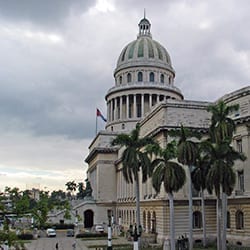The United States and Cuba, it seems, are poised to resume diplomatic relations severed in 1961. That year, John F. Kennedy was inaugurated as president of the United States; a plane carrying U.N. Secretary-General Dag Hammarskjöld crashed in the Congo; “The Dick Van Dyke Show” premiered on CBS; “Let’s Twist Again” by Chubby Checkers helped create an international dance sensation; “West Side Story” won the Academy Award for best picture; and I was a boy of four. In other words, 1961 was a long time ago.
Under the deal announced Wednesday, Cuba released Alan Gross, a U.S. contractor held since 2009, and agreed to release 53 political prisoners from a list of names provided by the United States. For its part, the United States freed three individuals convicted of spying for Havana and will ease travel and financial restrictions on Cuba. Talks aimed at reopening embassies will begin during the next few weeks.
The only bad part of the news is that it comes too late — at least 20 years too late. With the end of the Cold War, whatever threat Cuba may have posed to the United States essentially disappeared. For reasons more to do with domestic politics and ideological inertia than anything else, we have continued with a policy of isolation toward Cuba that is a textbook example of how not to conduct foreign affairs. For more than 50 years, we have tried to bring down the Castro regime with a trade embargo; for 50 years, we have failed. Indeed, our approach actually played into the Cuban government’s hands by giving it an excuse for decades of economic mismanagement.
There will be opposition to lifting the embargo on Capitol Hill. It is unclear how much legal latitude President Obama has in further loosening trade and travel restrictions without congressional action. But one thing is certain: We are seeing a dramatic break with a half-century of largely counterproductive policy.
Apparently, Canada and the Vatican helped foster the U.S.-Cuban deal during months of secret negotiations. Good for them. And good for President Obama, too, for finally moving to end a policy that had long since lost whatever rationale it might once have had.
Let us not deceive ourselves. There is much to dislike, even detest, in the Castro regime, which is an unabashed dictatorship with a long record of human rights abuses. But the United States has normal diplomatic and economic relations with unpleasant governments; indeed, we consider some of them valued allies. The move toward normalization of relations in no way signifies an endorsement of the Castro regime. It is just simple — if long overdue — good sense.
Joe Barnes is the Baker Institute’s Bonner Means Baker Fellow. From 1979 to 1993, he was a career diplomat with the U.S. Department of State, serving in Europe, Africa, the Middle East and South Asia.
